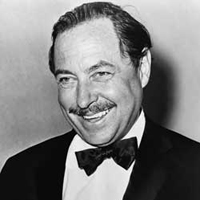Laura as a Romantic Superwoman in The Glass Menagerie
Laura Wingfield is the sort of character who chose the world of fantasy in this mundane world of naked reality. Laura Wingfield was face to face with the brutal limitations of this phenomenal world. She felt oppressed by the harshness of the external world. She knew that the phenomenal world, the world of self-fulfillment can't accommodate the greatness of her vision and view.

Tennessee Williams (1911-1983)
The worlds of matter, the world of phenomenon, the world of stark eventualities were anathema to Laura. That is why she longed for the world of fantasy, the world of imagination and the world of isolation. The external world had made her heavily inferior. That is why she chose to live in the world of fantasy. In her fantasy world she made full use of her imagination. She manufactured little glass animals like unicorns. All those products in her Menagerie were breakable, soft and delicate. She did not care anything at all about the world. More and more she depended upon her imagination and fantasy. She resembles a romantic figure. Laura represents the kind of woman who, despite life's hardships, has maintained her love for nature and art as depicted by her collection of glass animals. Her name in itself is symbolic of her affection for nature. As an artist Laura represents the artists longing for absolute fulfillment she stands for the fragile, almost unearthly ego brutalized by life in the industrialized, depersonalized cities of the western world. The physically and emotionally fragile Laura escapes from her mid-twentieth-century-urban predicament in St. Louis, to which her family has migrated from the rural-pastoral south.
Like a romantic, Laura expresses her love for nature. In the collection of little glass animals she made nature has found its expression. Even Laura's name signifies her affinity for the natural together with the transcendent: "Laura" is, somewhat ironically derived from the laurel shrub or tree, a wreath of which was conferred as a mark of honor in ancient times upon heroes and athletes; and "Wingfield" brings to mind the flight of birds across a meadow.
Jim's nickname for Laura "Blue Roses" signifies her affinity for natural-flowers-together with the transcendent-blue flowers, which do not occur naturally and thus come to symbolize her yearning for both ideal and mystical beauty and spiritual or romantic love. That beauty is also symbolized by Laura's favorite among the animals in her glass menagerie, the fabled, otherworldly, unicorn. And that love comes to her, however fleetingly, in the person of her name, Jim O'Connor, who beatifies, Laura by emphasizing what is special, even divine, about her and downplaying her disability.
Laura embodies a remarkable, romantic ethos. Her dedication to art, her adherence to nature and her effort to attain transcendence collectively signify the imbedded romantic perspective on the play The Glass Menagerie. Moreover, the playwright's fascination with symbols, images and the filtration of experiences come through memory.
The Glass Menagerie Study Center
Nature of illusion in The Glass Menagerie
Dramatic Technique in The Glass Menagerie
Tom as a Representative of the 20th Century Man
The Glass Menagerie Study Center
Introduction of The Glass Menagerie
Summary of The Glass Menagerie
Symbolism in The Glass Menagerie
Sublimating Animal Drives into Aesthetics
Style of Williams in The Glass Menagerie
Biography of Tennessee Williams
 |
bachelorandmaster.com |